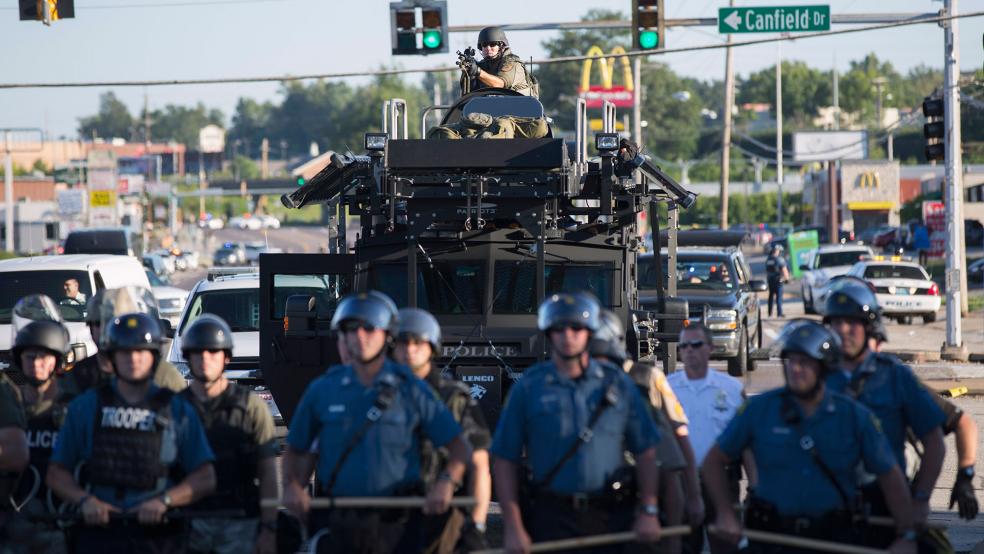A growing chorus of lawmakers is calling for a review of the Pentagon’s program responsible for arming local police departments like Ferguson, Mo., with military equipment including armored vehicles, grenade launchers and tactical gear.
The Ferguson police department’s use of such equipment while responding to protests over the death of Michael Brown has prompted a handful of members of Congress to denounce or at least raise questions about the program that has equipped local police officers with the same M-16s and Kevlar helmets used by soldiers in Iraq and Afghanistan.
Related: The Pentagon Equipped Ferguson’s Police Dept.
“A militarized police force facing down innocent protesters with sniper rifles and machine guns is totally unacceptable in America," Rep. William Clay (D-MO) said on CNN’s “State of the Union.”
The 1033 program is part of the Defense Authorization Act approved by Congress every year. It permits the transfer of military surplus equipment into the hands of local police departments across the country at very little cost to them. Instead, the federal government picks up most of the check. So far, the government has awarded at least $34 billion in grants to the police to stockpile the equipment, an investigation by The Daily Beast and the Center for Investigative Reporting found.
The program was first enacted in the 1990s to help arm local police in the war on drugs, while making use of expensive, outdated military equipment that would otherwise be destroyed. Its use has expanded since September 11, as more departments request the equipment for counter-terrorism reasons; even smaller towns like Fargo, N.D. that don’t necessarily face a huge risk of terrorism receive equipment from the program.
So far, the federal government has distributed at least $4.3 billion in equipment to local police, according to the American Civil Liberties Union.
Related: 10 military Weapons You Won’t Believe the Police Have Access To
"Some of these police departments that have received this equipment have not been properly trained in its use by the military. So, that is a question that some of my colleagues in Congress have said that they are going to try to get answers to," Clay said.
Senate Armed Services Committee Chairman Carl Levin (D-MI) said on Friday that the Senate plans to examine the program in September.
“We intended this equipment to keep police officers and their communities safe from heavily armed drug gangs and terrorist incidents,” Levin said in a statement. “Before the defense authorization bill comes to the Senate floor, we will review this program to determine if equipment provided by the Defense Department is being used as intended.”
Others say it should be scrapped entirely.
Missouri Democratic Sen. Claire McCaskill and Rep. Hank Johnson (D-GA) are in “talks’ to introduce a companion bill in the House and Senate to end the transfer of military arms to law enforcement agencies,” Politico reported.
"Our main streets should be a place for business, families, and relaxation, not tanks and M16s," Johnson wrote in a Dear Colleague letter sent Thursday to other members of Congress. “As the tragedy in Missouri unfolds, one thing is clear. Our local police are becoming militarized,” Johnson's office said in a statement.
The measures are expected to be introduced in September, when Congress returns from August recess.
But not everyone thinks the program should be eliminated. Former New York Police Chief Bernard Kerik said on CNN’s State of the Union” that it is “absolutely needed.”
"This goes back to the early '90s and the drug war …Drug dealers had far better equipment, more equipment, more dangerous equipment than the police," he said.
Though he admitted that “some of the weapons” police used in Ferguson were not needed, he defended their use of heavy military equipment.
"There were Molotov cocktails thrown. There was … property that was damaged. The police have to respond to that. You can't let the thugs take over the city," Kerik said.
His comments come after a violent night in Ferguson on Saturday, where one person was shot, and seven people were arrested as the protestors and police clashed again. Police offers again sprayed tear gas at protestors who defied the city’s new, temporary curfew imposed by Missouri Gov. Jay Nixon.
“When I was watching the film footage coming out of Ferguson, it looked like it was in Baghdad, or some other war torn zone," Rep. John Lewis (D-GA) said on NBC's "Meet the Press" on Sunday. "You know, Ferguson is a part of the United States of America. It’s not China, it’s not Russia, it’s not the Congo, it’s America, people have a right to protest, people have a right to engage in peaceful nonviolent action and the press have a right to cover what is going on.”
Meanwhile, the Justice Department said Sunday that it would request an independent autopsy of Brown’s body “due to extraordinary circumstances involved in this case and at the request of the Brown family."
Top Reads from The Fiscal Times





